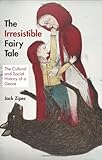The Irresistible Fairy Tale: The Cultural and Social History of a Genre
Book description:
If there is one genre that has captured the imagination of people in all walks of life throughout the world, it is the fairy tale. Yet we still have great difficulty understanding how it originated, evolved, and spread--or why so many people cannot resist its appeal, no matter how it changes or what form it takes. In this book, renowned fairy-tale expert Jack Zipes presents a provocative new theory about why fairy tales were created and retold--and why they became such an indelible and infinitely adaptable part of cultures around the world.
Drawing on cognitive science, evolutionary theory, anthropology, psychology, literary theory, and other fields, Zipes presents a nuanced argument about how fairy tales originated in ancient oral cultures, how they evolved through the rise of literary culture and print, and how, in our own time, they continue to change through their adaptation in an ever-growing variety of media. In making his case, Zipes considers a wide range of fascinating examples, including fairy tales told, collected, and written by women in the nineteenth century; Catherine Breillat's film adaptation of Perrault's "Bluebeard"; and contemporary fairy-tale drawings, paintings, sculptures, and photographs that critique canonical print versions.
While we may never be able to fully explain fairy tales, The Irresistible Fairy Tale provides a powerful theory of how and why they evolved--and why we still use them to make meaning of our lives.
Jack Zipes is professor emeritus of German and comparative literature at the University of Minnesota and the author, translator, and editor of dozens of studies and collections of folk and fairy tales. His recent books include Why Fairy Tales Stick: The Evolution and Relevance of a Genre; Relentless Progress: The Reconfiguration of Children's Literature, Fairy Tales, and Storytelling; and The Enchanted Screen: The Unknown History of Fairy-Tale Films.
Table of Contents:
List of Illustrations ix
Preface xi
Acknowledgments xvii
Chapter 1: The Cultural Evolution of Storytelling and Fairy Tales: Human Communication and Memetics 1
Chapter 2: The Meaning of Fairy Tale within the Evolution of Culture 21
Chapter 3: Remaking "Bluebeard," or Good-bye to Perrault 41
Chapter 4: Witch as Fairy/Fairy as Witch: Unfathomable Baba Yagas 55
Chapter 5: The Tales of Innocent Persecuted Heroines and Their Neglected Female Storytellers and Collectors 80
Chapter 6: Giuseppe Pitrè and the Great Collectors of Folk Tales in the Nineteenth Century 109
Chapter 7: Fairy-Tale Collisions, or the Explosion of a Genre 135
Appendix A: Sensationalist Scholarship: A "New" History of Fairy Tales 157
Appendix B: Reductionist Scholarship: A "New" Definition of the Fairy Tale 175
Notes 191
Bibliography 209
Index 227
Endorsements:
"This is Zipes's magnum opus, the culmination of more than thirty years of research, and his broadest consideration yet of the fairy tale. He tackles very difficult fundamental questions, and provides credible theoretical foundations and historical evidence for the answers he proposes. Ultimately, he redirects the conversation about the origins, nature, and appeal of the fairy tale."--Donald Haase, editor of Marvels & Tales: Journal of Fairy-Tale StudiesYou can also read the first chapter here. Or click to look inside the book on Amazon where you can preview the book, too.
"Liberating, stringent, and new, this book demonstrates Zipes's unique and important affection for fairy tales while opening new lines of thinking about them. The Irresistible Fairy Tale--like fairy tales themselves--will appeal to both scholars and general readers. Its enlightening tone is irresistibly good."--Kate Bernheimer, author of Horse, Flower, Bird: Stories and editor of Fairy Tale Review
"This is an important examination of the elusive quality of the fairy tale. Everywhere in evidence is Zipes's mastery of the subject, his capacity to engage with its folkloric, literary, social, and cultural aspects, and his ability to communicate with general readers as well as specialists."--Graham Anderson, University of Kent


No comments:
Post a Comment
Note: Only a member of this blog may post a comment.